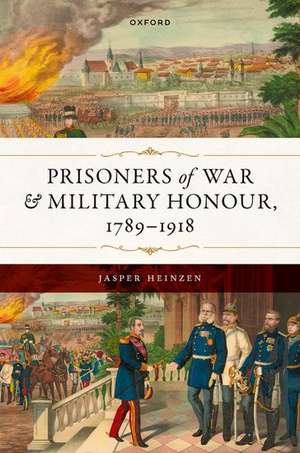Prisoners of War and Military Honour, 1789–1918
Autor Jasper Heinzenen Limba Engleză Hardback – 6 feb 2025
Preț: 596.73 lei
Preț vechi: 852.53 lei
-30% Nou
Puncte Express: 895
Preț estimativ în valută:
114.18€ • 119.54$ • 94.48£
114.18€ • 119.54$ • 94.48£
Carte disponibilă
Livrare economică 05-11 martie
Preluare comenzi: 021 569.72.76
Specificații
ISBN-13: 9780192871169
ISBN-10: 0192871161
Pagini: 368
Dimensiuni: 165 x 242 x 28 mm
Greutate: 0.75 kg
Editura: OUP OXFORD
Colecția OUP Oxford
Locul publicării:Oxford, United Kingdom
ISBN-10: 0192871161
Pagini: 368
Dimensiuni: 165 x 242 x 28 mm
Greutate: 0.75 kg
Editura: OUP OXFORD
Colecția OUP Oxford
Locul publicării:Oxford, United Kingdom
Notă biografică
Jasper Heinzen completed his undergraduate studies at the Universities of Otago and Canterbury in New Zealand before obtaining an MPhil and PhD from the University of Cambridge. He is a senior lecturer in modern European history at the University of York. Research for the book was graciously supported by a Marie Curie Fellowship at the University of Bern, a EURIAS Fellowship at the Paris Institut d'études avancées, and a Leverhulme Fellowship, as well as a number of smaller grants.
